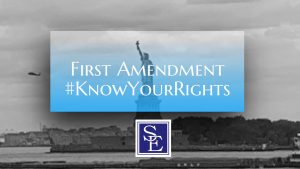The Third Circuit Court of Appeals has ruled in favor of a public employee who alleges she was terminated by her public employer for inquiring into a complaint that she had been illegally recorded during a conversation with a union leader. In reversing the district court’s decision, the court reinforced the separation of a public employee’s speech in their capacity as a private citizen in comparison to what they say in their capacity as a public employee. This case is a reminder that public employees do not waive their First Amendment rights by accepting public employment and have job protections when they engage in protected activity under the United States Constitution.
In this case entitled Javitz v. County of Lucerne, the plaintiff, Donna Javitz’s was employed as the director of human resources for Lucerne County. During her employment, Ms. Javitz’s alleges that she made a report to the district attorney that she had allegedly been illegally recorded when she met a union leader in her official capacity. The county manager told Javitz and the district attorney to drop the matter, but Javitz followed up with questions on the status of the investigation regarding the recording. Suddenly, her relationship with her employer became rocky and Javitz was abruptly terminated. Javitz claimed that her termination was in retaliation for reporting the alleged illegal recording to the district attorney.
The county employer alleged that Javitz had been working within her capacity as a public employee when she was inquiring about the status of the investigation and therefore no First Amendment violation existed. The district court agreed and cited to the Lucerne County Code of Ethics as the source by which it found her conduct in reporting the illegal activity to be within her official capacity as a county employee. Because the action was within her duties as an employee, the District Court concluded that the report did not qualify as speech protected by the First Amendment.
The Third Circuit disagreed, finding that the actions taken by Javitz were not taken within her official capacity, but rather as a private citizen. The court noted that her inquiries related to potential criminal actions taken in connection the recording of the conversation. In rendering its analysis and decision, the court looked to Supreme Court precedent in Pickering v. Bd. of Educ. and companion cases Garcetti v. Ceballos, and Lane v. Franks, each of which helped to fine tune the First Amendment rights of public employees to engage in protected speech of workplace issues.
The Supreme Court established what is now known as the Pickering balancing test, which has been since frequently used by courts to determine whether public employee speech is protected by the First Amendment. Under the Pickering balance court, courts are first to determine if the speech in question is that of a matter of public concern. If it is, courts will then evaluate whether the employer was justified in treating the employee differently from any other member of the general public in discriminating against the employee on the basis of the speech, against the employee’s interest in the protected speech. The matter of Garcetti v. Ceballos further refined the inquiry by holding that when public employees make statements in their official capacities, the employees are not speaking as citizens for First Amendment purposes and therefore the Constitution does not insulate their speech from employer discipline. Garcetti at 421. In Lane v. Franks, 573 U.S. 228 (2014), the court explored the nexus between an employee’s speech and his/her job duties and identified that the critical issue is “whether the speech at issue is itself ordinarily within the scope of an employee’s duties, not whether it merely concerns those duties.” Lane at 240.
The Third Circuit’s holding in Davits explained that the protocols established in the Lucerne County Code of Ethics do not constitute a “formal job duty or responsibility.” Therefore, the district court’s emphasis on the Code of Ethics was misplaced. These materials were not part of any mandatory employment duty, rather they existed to encourage employee behavior. The court explained that “[i]t is commonplace for ethics codes and employee handbooks to encourage reporting wrongdoing, and absent some formal job duty or responsibility, such encouragement is not enough to bring [an employee’s] reporting into the realm of [his or her] official duties.”
The court’s determination that the policies within the Code of Ethics does not create an affirmative job duty can be extended to policies within employment handbooks. Essential to the court’s holding was the fact that Javitz’s report to the district attorney was an action respecting an alleged crime, which was only tangentially related to her public employment. Her actions did not constitute “official action” within the scope of her official capacity.
The holding by the Third Circuit reaffirms that the courts are the steadfast guardians of the First Amendment and workplace retaliation. The Supreme Court and the Third Circuit have repeatedly held that the speech of public employees is protected speech when they speak in their capacities as private citizens. Despite holding the status of a public employee, when public employees speak on behalf of themselves as citizens – even if the subject matter relates to their public position – they are acting as private citizens. This holding is a victory for the free speech rights of public employees who continue to have and enjoy the freedom to speak unhindered by the pivotal roles they play in our government.
 New Jersey Employment Lawyers Blog
New Jersey Employment Lawyers Blog


